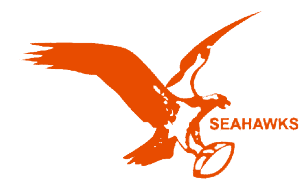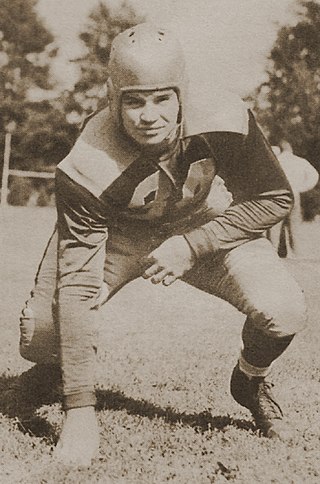
The All-America Football Conference (AAFC) was a major professional American football league that challenged the established National Football League (NFL) from 1946 to 1949. One of the NFL's most formidable challengers, the AAFC attracted many of the nation's best players, and introduced many lasting innovations to the game. However, the AAFC was ultimately unable to sustain itself in competition with the NFL. After it folded, three of its teams were admitted to the NFL: the San Francisco 49ers, the Cleveland Browns and the original Baltimore Colts.

The Miami Seahawks were a professional American football team based in Miami, Florida. They played in the All-America Football Conference (AAFC) in the league's inaugural season, 1946, before the team was relocated to Baltimore. They are notable as the first major league sports franchise in Miami.

The Baltimore Colts were a professional American football team based in Baltimore, Maryland. The first team to bear the name, it was a member of the All-America Football Conference (AAFC) from 1947 to 1949 and then joined the National Football League (NFL) for one season before folding. The Colts were one of the least successful teams in the AAFC and NFL both on and off the field, winning only 11 of their 54 games in their history. In 1953, Baltimore was granted an expansion team that revived the Colts name. That franchise moved in 1984 and became the Indianapolis Colts.
The 1990 NFL season was the 71st regular season of the National Football League (NFL). To increase revenue, the league, for the first time since 1966, reinstated bye weeks, so that all NFL teams would play their 16-game schedule over a 17-week period. Furthermore, the playoff format was expanded from 10 teams to 12 teams by adding another wild card from each conference, thus adding two more contests to the postseason schedule; this format was modified with realignment in 2002 before the playoffs expanded to 14 teams in 2020.
The 1950 NFL season was the 31st regular season of the National Football League. The merger with the All-America Football Conference (AAFC) expanded the league to 13 teams. Meanwhile, television brought a new era to the game. The Los Angeles Rams became the first NFL team to have all of its games – both home and away – televised. The Washington Redskins became the second team to put their games on TV. Other teams arranged to have selected games televised.

Robert James "Hunchy" Hoernschemeyer was an American football player. A native of Cincinnati, he played college football as a halfback for the Indiana Hoosiers football in 1943 and 1944 and as a quarterback for the Navy Midshipmen football team in 1945. He led the NCAA in both total offense and passing yards during the 1943 season.
The 1946 Cleveland Browns season was the team's first in the All-America Football Conference (AAFC). The Browns, coached by Paul Brown, ended the year with a record of 12–2, winning the AAFC's Western Division. Led by quarterback Otto Graham, fullback Marion Motley and ends Dante Lavelli and Mac Speedie, the team won the first AAFC championship game against the New York Yankees.
The 1947 Cleveland Browns season was the team's second in the All-America Football Conference (AAFC). Led by head coach Paul Brown, Cleveland finished with a 12–1–1 record, winning the Western division and the AAFC championship for the second straight year. As in 1946, quarterback Otto Graham led an offensive attack that featured fullback Marion Motley, ends Dante Lavelli, and Mac Speedie.
The 1948 Cleveland Browns season was the team's third in the All-America Football Conference (AAFC). After winning the AAFC crown in 1946 and 1947, the league's first two years of existence, the Browns repeated as champions in 1948 and had a perfect season, winning all of their games.
The 1949 Cleveland Browns season was the team's fourth and final season in the All-America Football Conference (AAFC). The Browns finished the regular season with a 9–1–2 win–loss–tie record and beat the San Francisco 49ers to win their fourth straight league championship. In the season's sixth game on October 9, the 49ers stopped the Browns' professional football record unbeaten streak at 29 games. It began two years earlier on October 19, 1947, and included two league championship games and two ties.

The All-America Football Conference (AAFC) was an American football league which challenged the established National Football League (NFL) from 1946 to 1949.

Martin Owen Ruby was an offensive tackle and defensive tackle for the New York Yankees and the Brooklyn Dodgers in the All-America Football Conference (AAFC), New York Yanks of the National Football League (NFL), and the Saskatchewan Roughriders of the Western Interprovincial Football Union (WIFU). He lived in Waco, Texas, while he was a professional player.

Chester Frank Adams was a professional American football tackle and placekicker who played ten seasons in the National Football League (NFL) and All-America Football Conference (AAFC), mainly with the Cleveland Rams and Cleveland Browns. He was selected to the NFL's All-Star game twice. In 1978, he was inducted into the Greater Cleveland Sports Hall of Fame.
The 1946 San Francisco 49ers season was the inaugural season of the San Francisco 49ers and the first season of the All-America Football Conference. Led by head coach Buck Shaw, the team compiled a 9–5 record and finished second in the AAFC West Division. The 49ers also had the second best scoring offense in the AAFC.

The 1947 Baltimore Colts season was the inaugural season of the Baltimore franchise in the All-America Football Conference (AAFC). In this 1947 Colts debut, the team finished last in their division, winning only two games.

Roman John "Ray" Piskor was an American football tackle who played three seasons in the All-America Football Conference (AAFC) between 1946 and 1948. Piskor played for the New York Yankees, Cleveland Browns and the Chicago Rockets. Piskor grew up in North Tonawanda, New York and attended Niagara University, where he was a star lineman. After several years in the Army Air Force during World War II, he was signed by the Yankees in 1946. Piskor was traded to the Browns the following year, when the team won the AAFC championship. He spent a final season with the Rockets in 1948.
The 1946 AAFC season was the first season of the All-America Football Conference, a new professional league established to challenge the market dominance of the established National Football League. The league included eight teams, broken up into Eastern and Western divisions, which played a 14-game official schedule, culminating in a league championship game.
The 1947 AAFC draft was the first collegiate draft of the All-America Football Conference (AAFC). It used an inverse order to the teams' final standings in the 1946 season. The Buffalo Bills, which had finished with the same record as the Brooklyn Dodgers, drafted second in each round, with Brooklyn drafting third.
Edward T. Balatti, also known as Attilio Balatti was an American football cornerback and tight end who played three seasons for the San Francisco 49ers, also spending time with the Buffalo Bills and New York Yankees. He also played for the San Francisco Packers and the San Francisco Clippers of the Pacific Coast Professional Football League.








